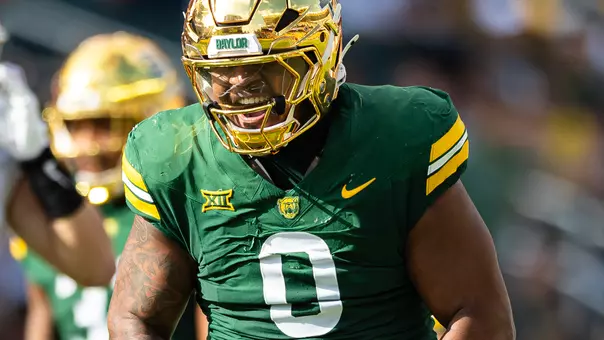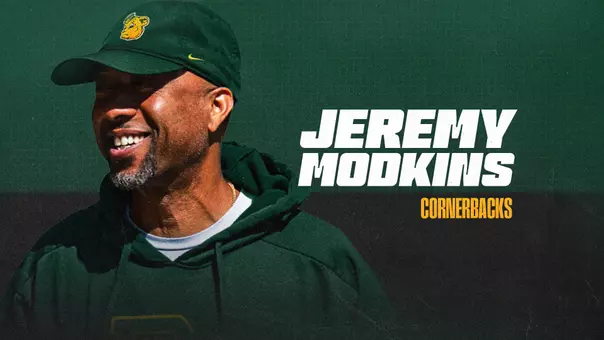The 'B' Line . . . December 10, 2003
12/10/2003 12:00:00 AM | Football
Dec. 10, 2003
WACO, Texas - This is another "B" Line column, a collection of news items of particular interest to members of the Baylor "B" Association. Contribute news about you or your teammates via e-mail to Lee Harrington (leenelaine@281.com), Dutch Schroeder (Dutch_Schroeder@baylor.edu), Reba Cooper (Reba_Cooper@baylor.edu) or Jack Loftis (Jack.Loftis@chron.com). The mailing address is Baylor "B" Association, P. O. Box 8120, Waco, TX 76714.
When Baylor graduate Hayden Fry and SMU's Jerry Levias were inducted into the College Football Hall of Fame this week, a lot of old Southwest Conference memories were stirred - and not all of them were pleasant.
Fry, 74, had been a pretty good quarterback for Baylor during the late 1940s, but his enthronement was based on his coaching years at SMU, North Texas and Iowa. Overall, his record was 232-178-10. But his glory years were at Iowa, where he toiled for 20 years and retired with a 143-87-6 mark, taking the Hawkeyes to 14 post-season games, including three trips to the Rose Bowl.
Only a Bowl Championship Series computer would attempt to block Fry's entry into the South Bend, Ind., shrine, but if further evidence of his worthiness is ever necessary just let Levias know.
Levias, 54, grew up in Beaumont and had an outstanding collegiate and professional career as a 5-7, 170-pound receiver. But despite his skills, he will always be known as the first black athlete to receive a football scholarship in the SWC.
And who was responsible? Why, Coach Hayden Fry, of course.
An understanding . . .
Fry told sportswriter Michael Murphy of The Houston Chronicle that when he was offered the job at SMU he hesitated until the school agreed he could recruit black players.
"They put me off for a couple of weeks," Fry said. "But they finally said, `We had a board meeting, and we decided that you could bring in one black player - if he qualifies.' They went through all the academic requirements, like needing a 1,000 on the SAT.
"Jerry had all the qualifications. He had to be a good student . . . and he had to be a player, because he couldn't be sitting on the bench. And he had to have a thick skin. When we discovered Jerry, it was like the good Lord reached down, put his hand on my shoulder and said, `Let's go.' It was the right thing to do."
Before graduating in 1968, Levias not only made All-America, but also was a three-time Academic All-American. And he had the thick skin, too. However, the verbal and physical attacks he suffered were hurtful then, just as the memories are today.
"College was kind of a proving ground for me as a person," Levias told The Chronicle's Murphy. "But on the other hand it was a very sad time for me. Sometimes right now I can't believe that I could take all that and do what I did. It's like I'm looking at it through some kind of out-of-body experience. So I look back on that as a very hard time for me. And very painful."
Enter John Westbrook . . .
Levias eventually became an All-Pro while playing with the San Diego Chargers and the Houston Oilers. Yet despite his many accomplishments, one honor eluded him.
He was not the first black player to appear in a game for a SWC team.
That mark of distinction went to Baylor's John Westbrook on Sept. 10, 1966, when he entered a game against Syracuse. Because the contest in Waco was being televised nationally, its kickoff occurred before Levias and his SMU teammates had a chance to open their season in Dallas. Thus, Westbrook found his place in history.
One of five black walk-ons for BU Coach John Bridgers in 1965, Westbrook played his high school football in Elgin. Like Levias, he was the object of racist remarks by Baylor opponents and fans on both sides of the field. He also suffered more than his share of cheap shots on the field and the contempt of some game officials who failed to notice the physical abuse.
After his appearance against Syracuse - a game the Bears won 35-12 - Westbrook received a scholarship and lettered in 1967 and 1968. In his final season, he scored the winning touchdown in Baylor's 21-14 victory over Rice.
Following graduation, Westbrook became a Baptist minister and died in 1983 at the age of 35.
(The "B" Line column is written by Jack Loftis, editor emeritus of The Houston Chronicle and chairman of the Baylor "B" Association Communications Committee.)



















